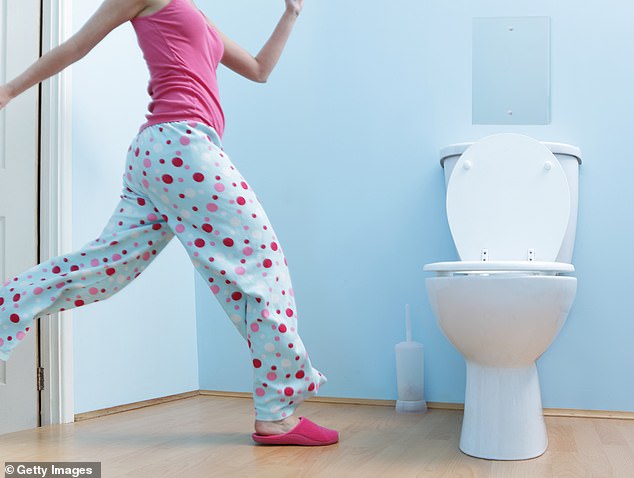I am a 74 year old woman and every time I cough violently I feel like I need to go to the bathroom.
It’s gotten so bad that I run to the bathroom every time I cough, just in case.
Could it be a pelvic floor problem?
Dr. Kaye says the pelvic floor can weaken as we age, particularly after menopause.
Dr. Kaye responds: Many people consider urine or stool leakage to be a normal part of aging, but this is not the case at all. In women, the problem is often due to a weakness in the pelvic floor, the hammock of muscles in the pelvis that supports organs such as the bowel, uterus and bladder.
The pelvic floor can weaken as we age, especially after menopause.
It can also be affected by chronic cough or constipation, which put pressure on these muscles.
Fortunately, there are ways to combat the problem.
A physiotherapist specialising in women’s health can offer exercises to strengthen the muscles, which helps to reduce leakage. If this doesn’t work, there are medications that can reduce the urge to urinate. In some cases, patients may be offered surgery, for example to treat a prolapsed organ if that is contributing to the problem. These are all options that patients can discuss with their GP.
I was recently diagnosed with hypothyroidism and was prescribed a medication called thyroxine. But now I feel very hot in bed, which means I sweat and lose sleep. Is this a side effect of the medication?
Dr. Kaye responds: FEELING too hot or sweating is a common symptom of an underactive thyroid. Also known as hypothyroidism, it occurs when the body stops producing enough of the hormone thyroxine, which has functions such as regulating body temperature.
Thyroxine is created in the thyroid gland (located in the neck) and this disorder is much more common in women. In addition to feeling too hot or too cold, people with an underactive thyroid may also experience fatigue and weight gain. The condition is usually treated with levothyroxine (also known as thyroxine), which replaces the lost hormone with a man-made version.
However, this medication can cause patients to feel too hot overall, including at night.
The dose of levothyroxine that patients receive will fluctuate depending on how much their doctor feels is necessary. This can also change over time.
Someone who initially only has a mild form of hypothyroidism may see their condition worsen over the years, meaning they will need a higher dose of levothyroxine.
For this reason, patients usually have a blood test every year to monitor their levels. If someone taking levothyroxine continues to experience symptoms, they may need a higher dose or a dose reduction. This is something you can discuss with your GP.
I am 74 years old and have severe pain on the right side of my head that I have been experiencing for over two months. I was sent for a neck and spine x-ray and was told the results were “not bad considering my age”. I have not been offered any treatment and the pain keeps me awake all night. What should I do?
Dr. Kaye responds: There are many causes of headaches, but among older people, neck changes are a surprisingly common trigger. Most severe headaches are related to migraines or cluster headaches.
It is unknown what triggers these conditions, but they are thought to be caused by stress and fatigue. Both can cause head and neck pain on one side only. Patients often report other symptoms such as dizziness, vision problems and difficulty speaking.
In recent years, several new medications have been launched on the NHS that can reduce the risk of migraines occurring or reduce symptoms once they start.
However, migraines usually come and go, which means that anyone who has a constant headache probably has a different problem.
This is due to arthritis in the neck, which causes pain and stiffness, and may also radiate to the head.
In older people, this often occurs due to wear and tear on the joints over time, also known as osteoarthritis.
The condition can be painful and limit movement. In addition, many patients report that regular painkillers do not help much. However, there are other medications available to treat osteoarthritis pain.
These include the drug amitriptyline, which helps fight chronic pain and also helps you sleep. It is important for patients with headaches to receive a diagnosis (for example, if they are suffering from osteoarthritis) so that they can know what the next step should be.
Patients with long-term pain can also consult an NHS pain specialist, who can provide them with techniques to manage the uncomfortable sensation.
- Dr Ellie will be back next week. If you have any questions for Dr Ellie Cannon please email her at DrEllie@mailonsunday.co.uk
- Dr. Kaye is unable to engage in personal correspondence and her responses should be taken in a general context.
Image showing that the vaping epidemic must be fought
Britain’s largest doctors’ union has called for a total ban on all flavoured e-cigarettes in a bid to tackle the e-cigarette “epidemic”. I agree that urgent action is needed.
Figures show that vaping among children has increased almost sixfold in a decade, with often devastating consequences.
In the US, an 18-year-old girl was recently put on a ventilator due to lung damage and pneumonia. Juliet Roberts, above, became “addicted” to vaping when she was just 14.
Vapes often come in flavors that appeal to kids, but many adults who quit smoking and turn to vapes cite the pleasant flavors as a reason they made the switch.
Banning flavored vapes could ultimately drive some people back to cigarettes, which is far more dangerous.
- Have vapes helped you quit smoking? Would you miss the flavors if they were banned? Let me know what you think.


